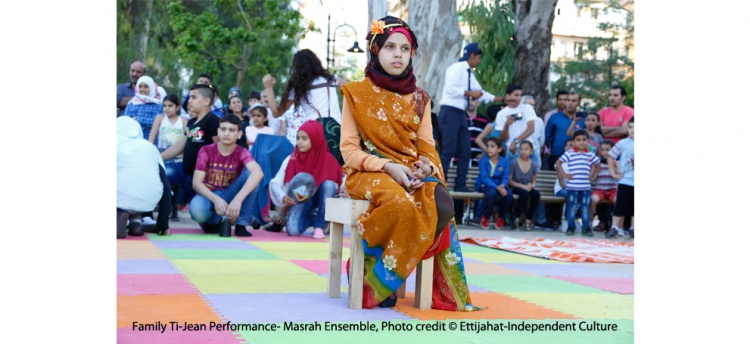Making the case for Culture and Development in the MENA region
Aug 2016Alma Salem, Independent artistic curator and cultural advisor
Many international cultural actions today are emphasizing the relation between culture and development as a priority.
On the 8th of June 2016 a joint Communication by the European External Action Service (EEAS) and the European Commission titled “Towards an EU Strategy for international cultural relations” was published and it will be discussed by the Council of the EU in autumn 2016. This came as a follow-up to the three devoted panels on the culture and development at the European Development Days (EDD) in 2015, and the lobbying pressure from the Global Campaign partners calling for the inclusion of culture in the 2030 agenda for sustainable development goals (SDG’s), adopted in September 2015.
The majority of governments the Middle East North Africa (MENA) region lack good governance, where dysfunctional institutions, corrupt systems, leading to restless censorship and abuse of the rights for artistic expression, and where supporting artists and creative forces is not given priority nor it is strategically positioned at the policy level to contribute to achieving development goal. The new international trend aiming to link culture and development is highly relevant to the region, since its geopolitical context, lack of internal stability, and fragile creative economies imply that the key funds for independent arts and culture manifestation remain inevitably dependent on EU cooperation among few others.
Although the relation between these two sectors is addressed in several key targets of the region’s cultural initiatives and organizations, yet it needs to become evidence based through research, referencing, and experimenting with new models and creative processes.
Where to start? The starting point is the definition of culture as: “who we are and what shapes our identity”. That understanding Culture as an ensemble of values, traditions, tangible and intangible heritage, religious beliefs, worldviews and the expressions of culture in ways of living – can facilitate the achievement of development goals.
A second entry point to the conversation is by approaching it from the development paradigm, meaning that development is premised on values, worldviews, ideological beliefs, vision, and is itself an act of culture that impacts willingly or adversely the culture of its intended beneficiaries.
Flagrant evidence to these claims can be seen in conflicts that are rooted in economic and power disparities, they might be fueled by the exploitation of cultural differences, and as a result conflicts impact development negatively through the destruction of infrastructure, social cohesion, brain drain, and human life. On the other hand, recognizing cultural diversity contributes poverty reduction, education, sustainable cities and environment, food security, economic growth, sustainable consumption and production patterns, conflict resolution and peaceful and inclusive societies.
The post-Arab spring in the MENA region, its geo-political context, and the new international priorities to link Culture and development create a momentum for its Cultural leaders, artists and practitioners to work more closely with development experts, to better explain these linkages at governance, social and economic levels.
To explain how good governance that is based on fundamental rights and freedoms also means the participation in communities’ cultural life, and the access to the arts as fundamental human right, and how respect for cultural diversity contributes to the pursuit of the full potential of citizens with physical, emotional, spiritual, intellectual stimulation, psychological catharsis, and the cultural dimensions of the exploration, celebration and transformation of the human condition within given circumstances,
To explain how respecting the specificity of local cultures supports social development, human wellbeing, social cohesion, social inclusion, equity and equality, and how culture embraces transmission of knowledge, establishing a new social contract, and social justice. How social development requires creativity and innovation as means of brining diversity into education, Health, poverty alleviation, demographics and other aspect of social development.
To explain how Heritage protection and development creative industries are key element of economic development that foster equality and preserves natural resources. That is an essential contributor to the creation of wealth and generation of economic resources. To demonstrate how economic development will benefit from capacity building and investment in all aspects of the value chain of the arts.
We need to recognize that an immense manifestation of artistic talents, cultural workforce dynamics, and artistic expressions and creativity continue to flourish in MENA region despite the severe vulnerability and instability , therefore the efforts need to focus on creating a narrative in support of materializing culture and development linkages, contribute to achieving SDGs targets, lobbying to showcase how Culture in a multicultural region paves the way for a human-centered, rights-based, and inclusive development.


